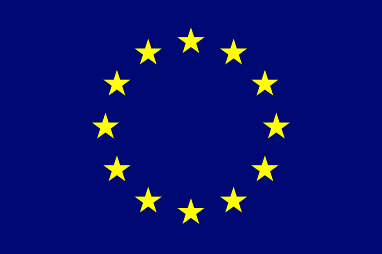Publications
Throughout the year, VOICE produces and disseminates key documents reflecting on humanitarian aid issues at the EU level and from an NGO perspective. They are addressed to decision-makers within the European institutions, at the National level, to NGO networks and other stakeholders of the humanitarian community, as well as to the VOICE members. Some documents are produced by the VOICE Secretariat with the support of VOICE members while others are publications from members and other key stakeholders in the humanitarian sector.
Please note that members-only documents will not be visible unless you are logged in.
-
Downward Spiral: the economic impact of Covid-19 on refugees and displaced people
22 September 2020Members' publicationsThe economic impact of public health measures to prevent the spread of the Covid-19 pandemic is having a devastating effect on communities affected by conflict and displacement. The Norwegian Refugee Council (NRC) research found that these communities have suffered widespread loss of income since the pandemic started. -
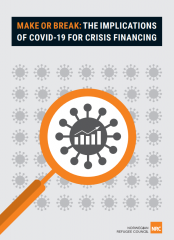
Make or break – the implications of Covid-19 for crisis financing
15 September 2020Members' publicationsThe Norwegian Refugee Council (NRC) commissioned this study to reflect on what the Covid-19 pandemic response tells us about the fitness of the international crisis financing system. The pandemic has provided a real-time stress test that demonstrates how the system performs under pressure and identifies opportunities for improvement.
The study coincides with a period in which humanitarian policymakers are taking stock of progress made under the Grand Bargain financing reforms and considering priorities for further reform. It also considers challenges and gaps not included in the Grand Bargain reforms. It reflects on the capacity of the international crisis financing system to respond to a new order of crises in an era when large-scale systemic risks may overlay and aggravate existing risks and needs. -
One Neighbourhood: CARE’s humanitarian response in Tripoli. ALNAP
08 September 2020Members' publications'One Neighbourhood: CARE’s humanitarian response in Tripoli' is the second in a series of case studies showcasing examples of humanitarian projects operating effectively in complex urban environments. The case study examines CARE's 'One Neighbourhood' project in Tripoli, Lebanon. The project aimed to build the resilience of affected communities and people in vulnerable neighbourhoods Tripoli neighbourhoods between 2015 and 2019 through individual shelter rehabilitation projects, communal projects, awareness-raising sessions, household outreach, committees and more. -
Joint Statement - Three Years On: Prospects for Durable Solutions and Justice Remain Elusive for Rohingya
25 August 2020Members' publications25 August 2020 marks three years since the mass atrocities in Rakhine State forced more than 700,000 Rohingya civilians to flee their homes. Three years on, the vast majority remain in overcrowded refugee camps in Cox’s Bazar, Bangladesh. In response to the current crisis VOICE members in Myanmar remain committed to supporting a principled response and protecting the rights of stateless groups, internally displaced persons, host communities, and other ethnic minorities in Myanmar and call on the government and all warring parties to cease all hostilities. -
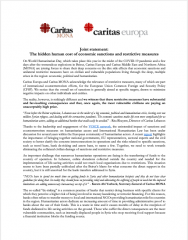
Joint statement: The hidden human cost of economic sanctions and restrictive measures
19 August 2020Members' publicationsOn World Humanitarian Day, which takes place this year in the midst of the COVID-19 pandemic and a few days after the tremendous explosions in Beirut, Caritas Europa and Caritas Middle East and Northern Africa (MONA) are joining forces to share their deep concerns on the dire side effects that economic sanctions and unilateral restrictive measures have on civilian and vulnerable populations living through the deep, multiple crises in the region: economic, political and humanitarian. -
Engaging with local faith actors and communities - a toolkit
12 August 2020Members' publicationsThis toolkit is published by ACT Alliance EU, Caritas Europa, EU-CORD and Islamic Relief Worldwide to give EU decision-makers a concise practical tool to encourage engagement of local religious leaders and faith communities in pandemic response and the post-recovery phase. -
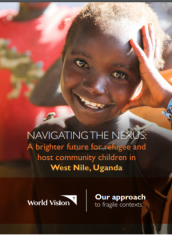
Navigating the nexus: A brighter future for children in West Nile, Uganda
11 August 2020Members' publicationsThrough its response to large-scale humanitarian needs precipitated by over a million South Sudanese refugees fleeing to Uganda throughout 2016 and 2017, World Vision has built an understanding of the needs and aspirations and gained the trust of many refugee and host communities in the region. This case study examines World Vision’s experience of adapting its programming in a refugee context to respond to the multiple needs of vulnerable children, families and communities; support them to achieve their long-term aspirations; and determine how these efforts can best foster social cohesion among and between households and communities. -
At What Cost: How chronic gaps in adaptation finance expose the world’s poorest people to climate chaos
06 August 2020Members' publicationsThe impacts of climate challenges are not inevitable. This report of the Zurich Flood Resilience Alliance with main partners Concern Worldwide and Mercy Corps deals with the financing of two existing measures – climate change adaptation and disaster risk reduction – to better manage and reduce the risk of climate-related disasters and enable people to cope with multiple shocks and stresses. -
The Triple Nexus Questions and Answers on Integrating Humanitarian Development and Peace Actions in Protracted Crises
06 August 2020Members' publicationsThis briefing note from WeWord-GVC presents the state of the humanitarian-development-peace Nexus, how the organization envisions and puts into practice its commitment to the Nexus and what impact the COVID-19 pandemic has on the reform agenda going forward. It complements the soon-to-be published WeWorld-GVC Nexus Principles, affirming what the organization believes are the most crucial elements of the Nexus that need incorporating into the operational practices of the organization. -
VOICE out loud 30 - Humanitarian Action in the Era of Climate Change
05 August 2020VOICE out loudIn this edition of the VOICE out loud, VOICE members explore the effects of the climate crisis on humanitarian action and share how humanitarian NGOs are working to address them. -
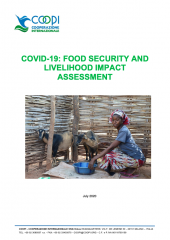
COVID-19: Food security and livelihood impact assessment
29 July 2020Members' publicationsCOOPI launched a “Food security and livelihood assessment” activity that will be carried out in 9 countries: Democratic Republic of Congo (RD Congo), Niger, Mali, Nigeria, Ethiopia, Iraq, Bolivia, Ecuador, Guatemala over a period of 3 months. By doing so, COOPI wants to better understand the implications of the COVID-19 crisis on the food security and livelihood of the communities it is working with, in order to be able to shape up interventions to support those communities to maintain their livelihoods whilst contributing to their recovery and longer-term economic development. -
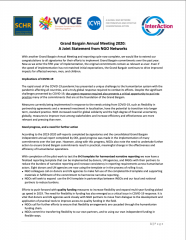
Grand Bargain Annual Meeting 2020: A Joint Statement from NGO Networks
29 July 2020Joint Statement from NGO Networks (SCHR, VOICE, ICVA and InterAction) following the 2020 Annual Grand Bargain Meeting. -
ETTG Brief - EU humanitarian aid: Caught between nexus and independence
24 July 2020This brief by the European Think Tanks Group (ETTG) analyses current issues in the EU’s humanitarian aid and makes recommendations for responding to the challenges ahead. Specifically, it addresses the tensions between the Commission’s ambition to be a geopolitical actor and to better respond to multidimensional crises through a ‘nexus approach’ and the strong needs-based humanitarian assistance the EU provides. The analysis is based on a structured review of academic and policy sources, complemented by interviews with Brussels-based humanitarian aid policymakers. -
VOICE President letter: Humanitarian Aid in the next MFF and Next Generation EU fund
15 July 2020VOICE President letter on the Humanitarian Aid in the next Multiannual Financial Framework and Next Generation EU fund to Presidents of European Council, Commission and Council of the European Union. -
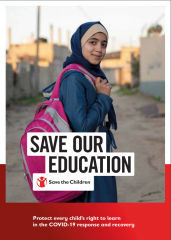
Save Our Education - Protect every child’s right to learn in the COVID-19 response and recovery
14 July 2020Members' publicationsThis new report from Save the Children warns of ‘unprecedented global education emergency’. Deep budget cuts to education and rising poverty caused by the COVID-19 pandemic could force at least 9.7 million children out of school forever by the end of this year, with millions more falling behind in learning, Save the Children warns this new report. -
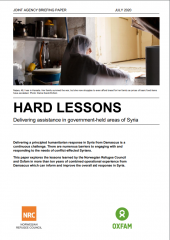
Hard Lessons - Delivering assistance in government-held areas of Syria
14 July 2020Members' publicationsDelivering a principled humanitarian response in Syria from Damascus is a continuous challenge. There are numerous barriers to engaging with and responding to the needs of conflict-affected Syrians. This paper explores the lessons learned by the Norwegian Refugee Council and Oxfam in more than ten years of combined operational experience from Damascus which can inform and improve the overall aid response in Syria. -
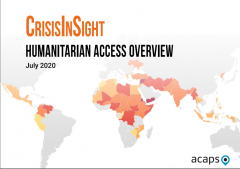
Crisis in Sight - Humanitarian Access Overview
14 July 2020ACAPS Humanitarian Access Overview provides a snapshot of the most challenging contexts worldwide. This report centers upon countries in which ACAPS had identified humanitarian crises. The analysis includes focused narrative and analysis on the impact of the COVID-19 outbreak on the different aspects of humanitarian access. In response to the pandemic, governments and civilians around the world have implemented measures aiming to contain the spread of the virus. In addition to humanitarian access constraints, these measures have presented challenges both for crisis-affected populations to access aid and for humanitarian organisations to operate. -
Evicted by Climate Change: Confronting the Gendered Impacts of Climate-Induced Displacement
09 July 2020Members' publicationsThis CARE report highlights the causes and consequences of climate-induced displacement and the urgent need for a gender-transformative response. The report also highlights the urgent need for more women’s leadership and greater financial support for gender-just solutions to climate-induced displacement. -
Myanmar: INGOs concerned upsurge in fighting in Rakhine State will cause greater hunger, displacement and vulnerability
03 July 2020Members' publicationsIn this statement, INGOs warn that the upsurge in fighting between the Arakan Army and the Myanmar Military in northern Rakhine State has led to many people fleeing their homes while others are trapped and unable to leave. They urge all actors to protect civilians, exercise restraint and prevent the further escalation of conflict. -
A Decade In Search of Work: A review of policy commitments for Syrian refugees’ livelihoods in Jordan and Lebanon
03 July 2020Members' publicationsThis new report builds on IRC’s “In Search of Work” briefing series, which reviewed progress on livelihoods commitments made by host and donor countries through the Jordan Compact from 2016 to mid 2018. This third update also includes a review of the livelihoods situation for refugees and host communities in Lebanon. The briefing draws on new evidence and emerging research findings on how refugees are managing their financial lives and analyses the impact of policy decisions made in both countries on livelihood opportunities. -
A Win-Win: Multi-year flexible funding is better for people and better value for donors
03 July 2020Members' publicationsThis report by International Rescue Committee (IRC), with support from Development Initiatives, builds on the already strong evidence base for multi-year flexible funding. A comparative analysis of two cash programmes in Somalia funded by DFID and Sida, which draws on data collected using the Systematic Cost Analysis (SCAN) tool developed by IRC with Save the Children and Mercy Corps, provides preliminary indications of quantifiable cost efficiency gains of multi-year funding. And three case studies—two multi-sector programmes in the Central African Republic and Camroon supported through Sida’s Programme-Based Approach (PBA) and a youth livelihoods programme in Côte d’Ivoire funded by the Mastercard Foundation—reveal the qualitative benefits of multi-year, flexible financing. -
Peacebuilding and Climate Change in Mali and Somalia
01 July 2020Members' publicationsA study commissioned by ACT Alliance, DanChurchAid and Norwegian Church Aid to learn more about the links between climate change and conflicts, and more importantly, to explore if efforts to adapt to the effects of climate change, can contribute to peace building. The study is based in Mali and Somalia, where there is a documented effect of climate change, and where people and communities have been facing violent conflicts
for many years. -
Plan International Adolescent Girls in Crisis: Voices from the Sahel
30 June 2020Members' publicationsThis research was conducted with adolescent girls, their families and communities in the Sahel region of Burkina Faso and Mali where people struggle with a long, complex and violent crisis. Its primary focus is the rights and voices of adolescent girls. -
-
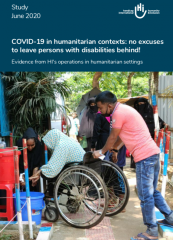
COVID-19 in humanitarian contexts: no excuses to leave persons with disabilities behind!
22 June 2020Members' publicationsA Study from Handicap International - Humanity & Inclusion with a collection and review of evidence aims
to illustrate how the COVID-19 crisis triggers disproportionate risks and barriers for men, women, boys and girls with disabilities
living in humanitarian settings.

